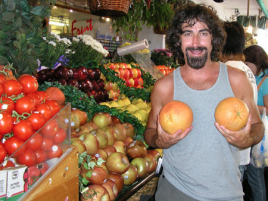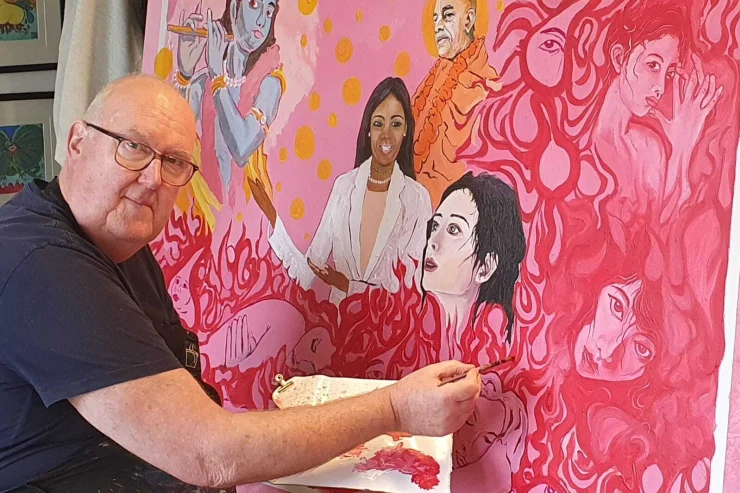Veg and the City: My Beef With Locavores
By Victoria Moran | Июл 25, 2010

The ally relationship can be an odd one. I remember my shock in third grade, learning that the Soviets had been our ally in World War II. “How could this be?” I wondered. “Our arch-enemies, the reason we have to crawl under our desks and prepare for The Bomb, were once our friends?”
I’m having similar feelings now, as I contemplate the locavore movement. As a vegan, and someone who believes in organic growing methods and family farms, I thought we were allies. I’m also a realist: I know the world isn’t going vegetarian overnight. Our numbers are growing, certainly, but the global demand for meat is greater than it’s ever been. Amid all this, I was happy to see a substantial group of small farmers, given a voice by authors and commentators such as Michael Pollan and Barbara Kingsolver, take a stand for better farming, including more humane methods of animal husbandry than the factory-farming norm. We didn’t have the same ultimate goal, but both theirs (replacing corporate agriculture with small, conscientious farms) and ours (a vegan planet) are so lofty that none of us will live to see either one. But for now we were, I thought, allies.
I’d go to the farmers’ market at Union Square–it’s every bit as gorgeous as anybody’s Eiffel Tower or Grand Canyon–and if the farmer selling goat cheese also had glorious spring greens, I’d buy her greens. It was totally friendly. I never said, “Shame on you for stealing the milk God meant for goat babies!” and she never said, “Damn you, veg-head: buy some cheese or you don’t deserve arugula!” And the couple that provide the provisions for my CSA (Community-Supported Agriculture: you buy a share in a small farm for a season) always knew that I wouldn’t be getting eggs. I didn’t ask for anything to make up for that, but they often put in some extra potatoes or apples or a bottle of herb-flavored vinegar. It was nice. We were allies.
And, in terms of individuals like that woman, that couple, and me, we still are. I fear, however, that a strong anti-vegetarian sentiment has grown up in the locavorism movement as a whole. Several recent documentaries suggest this. The first I saw, Food, Inc., was an impeccably researched indictment of the corporations that want to take over all food production and apparently don’t care how thoroughly we’re poisoned and “genetically modified” in the process. It showed small, organic farmers weighing in on the issue while doing what they do, in one case, cutting the heads off chickens. “This is hard to watch,” my husband whispered. “I know,” I said, “but he’s the good guy.”
The next film we saw was Food Fight. It went into detail about providing whole food in school cafeterias, rather the way chef Jamie Oliver did on his reality show, Jamie Oliver’s Food Revolution. No one could fault the sincerity of these people, but it did cross my mind that the vegan option–getting our nutrition firsthand rather than cycling it through animals who are, even in the best of circumstances, slaughtered in their youthful prime–was never mentioned.
My final cinematic foray into the locavores’ way of seeing things was a film called Fresh, screened at a yoga studio here in Manhattan. It featured The Omnivore’s Dilemma author Michael Pollan; Joel Salatin (the guy who beheaded the chickens in Food, Inc., and referred to himself in this doc as “a caretaker of creation”); and Will Allen, an urban farmer in Milwaukee, quoted in Fresh saying, “Food is the foundation, but it’s really about life.” Yes. I think so, too. Everybody’s life.
After that showing of Fresh, there was a group discussion led by two erudite young men, one of whom claimed to be a vegetarian but who joined his cohort in ripping to shreds the concept of a plant-based lifestyle. “A vegan diet is totally unsustainable in this part of the country,” somebody said. “That’s nuts,” I was thinking, remembering my grandmother and how she “put by” so much food with drying and canning, her pantry was overstuffed, even (according to my mom) during the Great Depression. My grandparents had a small farm in northern Missouri, and although they did raise animals, the produce alone could have gotten them through the winter. Hardy vegetables like cabbage and kale stayed in the garden, where Gramma built little coverings to protect them. “Now your kale is always sweeter after a frost,” she’d say.
Apples, potatoes, yams and winter squash went into the root cellar and were good till spring. Black walnuts, hazelnuts, and pecans joined them there. Tomatoes, string beans, peaches and pears were canned, along with all sorts of preserves and jams and marmalades. Beans and peas were dried, as was some of the fruit. Nobody in Missouri had heard the word “vegan” in those days, but if such a person had wandered by, he’d have been well-fed.
I didn’t pipe up with my opinion during the Q&A after that film, however, because I’d rather be an ally than an adversary. Besides, my message is to the farmers and their spokespeople, not a bunch of New Yorkers who think Long Island is “the country.” I want to tell them they need us vegans: There aren’t nearly enough low-intensity farmers growing animals to meet the demand. For them to make a dent in the marketplace, there will need to be millions of people not eating animal products. I’d tell them that I admire their commitment and believe there are ways we can work together, but that the vegetarian ethic didn’t come into being with modern factory farming. Some of us don’t like the idea of taking a life, even if that life wasn’t nonstop horrific, as on factory farms.
My vegetarian predecessors from Pythagoras to Einstein made two conclusions: First, the killing of a sentient being for anything less than self-preservation or to save another is wrong; and secondly, it is close to impossible to raise animals for food and keep the process consistently humane. My grandparents, on their little farm, did the things the locavores say farmers should be doing now. Their chickens lived in a coop, had access to the outside, and nobody seared off their beaks. Roosters were pretty much dispatched with, however, because one was enough. And come Sunday, a hen whose laying was waning a bit, had her neck wrung and she showed up on a platter. The pigs gave birth and nursed their young without the hideous confinement of farrowing crates, but each one was destined for slaughter and the runt of every litter was killed as an infant.
It wasn’t that my grandparents were bad people. They were simply trying to make a living and, in terms of animal agriculture, they–and the modern proponents of family farming–do it in the best way possible. This is why I want to be their ally. I know that as a vegan, I’m in a minority. People love their meat. It’s up there with sugar and TV and maybe even coffee on the list of inalienable American rights. As long as people demand the product, of course I champion anyone who’s willing to produce it with the least amount of suffering to the creatures involved, but that is still a great deal of suffering.
Former Michigan beef farmer Harold Brown put it this way on the site www.humanemyth.org: “In my experience, there is no such thing as humane animal products, humane farming practices, humane transport, or humane slaughter.” I realize that in quoting him, I’m bringing out one of the “big guns” from “my side,” just as the locavores have theirs. But I myself spent a day in a slaughterhouse once, and those sights and smells and screams will never leave me. With what I know and what I’ve experienced, I gladly I support anyone working to make things better. But, ultimately, “better” isn’t good enough.
Victoria Moran is the author of books including Creating a Charmed Life, Shelter for the Spirit, and The Love-Powered Diet. You can view all her books here at Amazon.com.















